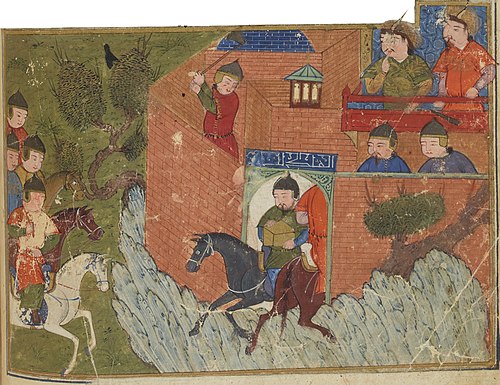Year 1256 (MCCLVI)
Year 1256 (MCCLVI) was a leap year starting on Saturday of the Julian calendar.
Events
By place
Mongol Empire
- Spring – Mongol forces (approximately 80,000 men), under Hulagu Khan, cross the Oxus River and initiate a campaign to dismantle the remaining Muslim states in southwestern Asia. The initial targets are the Nizari Ismaili strongholds and Baghdad, the capital of the Abbasid Caliphate. The roads across Turkestan and Persia are repaired, and bridges are constructed.
- October – Under the command of Baiju Noyan, Mongol forces achieve victory over Kaykaus II, the Seljuk ruler of the Sultanate of Rum, capturing Anatolia. Kaykaus seeks refuge in the Byzantine court at Constantinople. The Empire of Trebizond becomes a vassal state, paying an annual tribute in gold and silk.
- November 8–23 – Siege of Maymun-Diz: Mongol forces under Hulagu Khan successfully besiege the mountain castle of Maymun-Diz. After a three-day bombardment, the Nizari Isma’ili imam Rukn al-Din Khurshah surrenders.
- December 15 – Mongol forces capture and dismantle Alamut Castle after the surrender of the Nizari Ismaili leaders, leading to the foundation of the Ilkhanate dynasty of Persia, one of the four main divisions of the Mongol Empire.
Europe
- War of the Euboeote Succession: Achaean forces under William II of Villehardouin attempt to seize control of the island of Euboea, facing resistance from local Lombard barons allied with the Republic of Venice.
- July 30 – Venetian Marsilio Zorzi recaptures Curzola in Dalmatia, reinstating himself as Count of Curzola and Mèleda.
British Isles
- Prince Llywelyn ap Gruffudd invades northern coastal areas of Wales that previously agreed to English rule in 1254. Lord Edward requests support from King Henry III of England, but Henry refuses.
- The ancient Irish Kingdom of Breifne splits into East Breifne and West Breifne after a conflict between the O’Reillys and O’Rourkes.
Levant
- Venetian–Genoese Wars: A dispute arises between Venice and Genoa over land in Acre, leading to a Genoese attack on the monastery in the Venetian quarter, with both sides receiving support from various military orders.
By topic
Natural Disaster
- June 30 – A significant volcanic eruption occurs in Harrat Rahat (near Medina), linked to an Islamic prophecy.
Religion
- May 4 – Pope Alexander IV issues the papal bull Licet ecclesiae catholicae, establishing the Order of Saint Augustine at Lecceto Monastery.
- August 25 – In Bologna, slavery and serfdom are abolished, recorded in the document known as Liber Paradisus (or Heaven Book).
Births
- January 6 – Gertrude the Great, German mystic (d. 1302)
- January 24 – Alonso Pérez de Guzmán, Spanish nobleman (d. 1309)
- February 9 – William de Warenne, English nobleman (d. 1286)
- March 21 – Henry I, Margrave of Brandenburg (d. 1318)
- October 23 – Möngke Temür, Mongol ruler of Shiraz (d. 1282)
- Abu Hayyan al-Gharnati, Andalusian grammarian (d. 1344)
- Adolph VI, count of Holstein-Pinneberg-Schauenburg (d. 1315)
- Ahmad al-Suhrawardi, Persian calligrapher and musician (d. 1340)
- Al-Dimashqi, Syrian geographer and writer (d. 1327)
- Andrea Dotti, Italian preacher and saint (d. 1315)
- Ibn al-Banna, Almohad scholar and mathematician (d. 1321)
- Jamal al-Din al-Mizzi, Syrian scholar and philologist (d. 1341)
- John Segrave, English nobleman (d. 1325)
- Padishah Khatun, Mongol female ruler and writer (d. 1295)
- Robert, Count of Clermont, French prince (d. 1317)
- Roger Mortimer, English nobleman (d. 1326)
Deaths
- January 4 – Bernhard von Spanheim, German nobleman
- January 18 – Maria of Brabant, duchess of Bavaria (b. 1226)
- January 28 – William II of Holland, king of Germany (b. 1227)
- February 9 – Alice de Lusigan, English noblewoman (b. 1224)
- February 16 – Nicola Paglia, Italian Dominican priest (b. 1197)
- April 12 – Margaret of Bourbon, queen consort of Navarre (b. 1217)
- April 23 – Sabrisho V, patriarch of the Church of the East
- May 1 – Mafalda of Portugal, abbess and former queen consort of Castile
- May 6 – Peter Nolasco, French religious leader (b. 1189)
- June 13 – Tankei, Japanese Buddhist sculptor (b. 1173)
- September 1 – Kujō Yoritsune, Japanese shogun (b. 1218)
- September 21 – William of Kilkenny, English bishop of Ely
- October 14 – Kujō Yoritsugu, Japanese shogun (b. 1239)
- November 5 – Christina de Valognes, Scottish noblewoman
- Bertram de Criol, English constable and diplomat
- Jacob Anatoli, French Jewish translator (b. 1194)
- Johannes de Sacrobosco, English scholar and astronomer
- Klement of Ruszcza, Polish nobleman (b. 1190)
- Najm al-Din Razi, Persian philosopher (b. 1177)
- Pandulf of Anagni, Italian bishop (b. ?)
- Peter de Ramsay, Scottish nobleman and cleric
- Þórður kakali Sighvatsson, Icelandic chieftain (b. 1210)
- Rodrigo González Girón, Spanish nobleman (b. ?)
- Sibt ibn al-Jawzi, Arab preacher and historian (b. 1185)
References
Additional historical context and references may be provided to further elaborate on the events of 1256.

